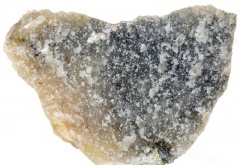Difference between revisions of "Kainite"
(Created page with "Kainite is a mineral salt that consists of potassium chloride and magnesium sulfate and is used as a fertilizer. This mineral is dull and soft, is colored white through yellow to...") |
|||
| (2 intermediate revisions by the same user not shown) | |||
| Line 1: | Line 1: | ||
| − | Kainite is a mineral salt that consists of potassium chloride and magnesium sulfate and is used as a fertilizer. This mineral is dull and soft, is | + | {{Infobox_Minerals |
| − | + | | image = Kainite-1.jpg | |
| − | When shipped in this form is subject to damage, contamination by water causing it to lose in strength but gain in weight. Wetting may also result in the formation of a solid mass giving rise to difficulties in discharge. | + | | origin = See text |
| + | | stowage factor = 3,6 m<sup>3</sup>/t (bulk) | ||
| + | | humidity and moisture = - | ||
| + | | ventilation = - | ||
| + | | risk factors = See text | ||
| + | }} | ||
| + | ==Descrption / Application== | ||
| + | Kainite is a mineral [[salt]] that consists of potassium chloride and magnesium sulfate and is used as a fertilizer.<br><br> | ||
| + | This mineral is dull and soft, is coloured white through yellow to red and is found in the Stassfurt salt mines in Saxony, Germany. It is a natural salt occurring in irregular granular masses, and is used as a source of potassium and magnesium compounds.<br><br> | ||
| + | ==Shipment / Storage / Risk factors== | ||
| + | Kainite is hygroscopic and liable to loss in weight but a very stable and hard mineral in its pure rock form. In this state it is shipped without risk of damage. After calcination it is changed into ‘mullite’ which can be ground, screened and sized for shipment in sacks. When shipped in this form is subject to damage, contamination by water causing it to lose in strength but gain in weight. Wetting may also result in the formation of a solid mass giving rise to difficulties in discharge. | ||
| + | |||
| + | |||
[[Category:Products]] | [[Category:Products]] | ||
| + | [[Category:Minerals and rocks]] | ||
Latest revision as of 08:44, 31 July 2013
| Infobox on Kainite | |
|---|---|
| Example of Kainite |  |
| Facts | |
| Origin | See text |
| Stowage factor (in m3/t) | 3,6 m3/t (bulk) |
| Humidity / moisture | - |
| Ventilation | - |
| Risk factors | See text |
Kainite
Descrption / Application
Kainite is a mineral salt that consists of potassium chloride and magnesium sulfate and is used as a fertilizer.
This mineral is dull and soft, is coloured white through yellow to red and is found in the Stassfurt salt mines in Saxony, Germany. It is a natural salt occurring in irregular granular masses, and is used as a source of potassium and magnesium compounds.
Shipment / Storage / Risk factors
Kainite is hygroscopic and liable to loss in weight but a very stable and hard mineral in its pure rock form. In this state it is shipped without risk of damage. After calcination it is changed into ‘mullite’ which can be ground, screened and sized for shipment in sacks. When shipped in this form is subject to damage, contamination by water causing it to lose in strength but gain in weight. Wetting may also result in the formation of a solid mass giving rise to difficulties in discharge.











